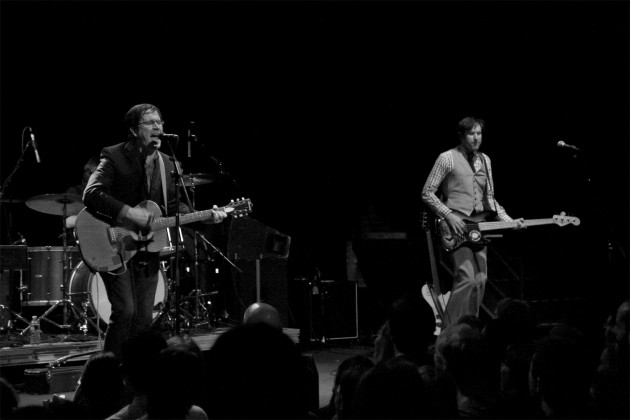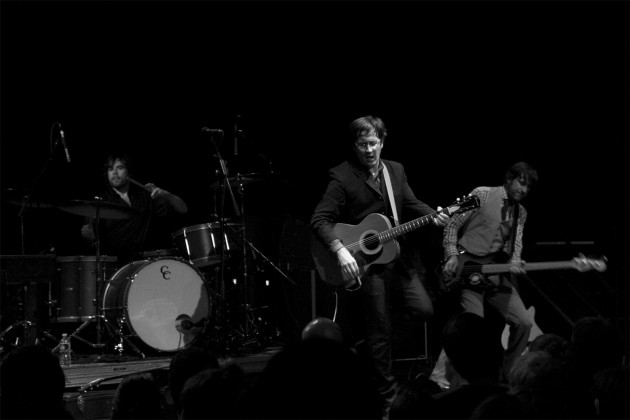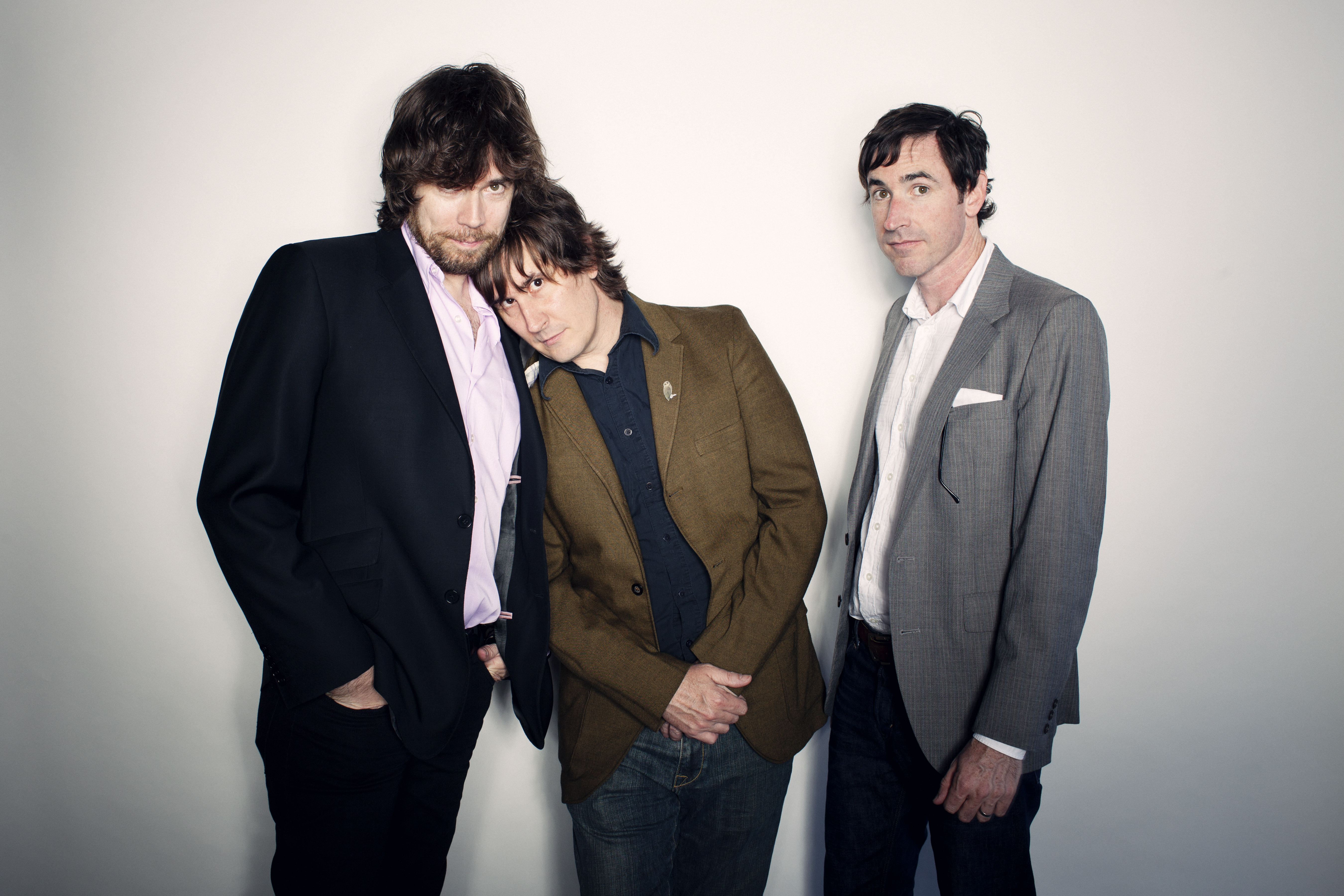 Photo by Nick Pereslugoff. Music Hall of Williamsburg
Photo by Nick Pereslugoff. Music Hall of Williamsburg
BPM: Of course, this is your 14th studio album?
JD: It’s the 2nd, I think.
[everyone laughs]
JD: Oh, I don’t know. I don’t count.
BPM: Especially with all the side projects…
JD: I mean, I’m always focused on the new stuff, and I know that’s a very business-sounding way of thinking of things. But I don’t… there’s a sense in which an album is just an artifact after something has happened. By the time the album comes out, most artists I know of have moved on. You’re looking toward the tour, you’re looking toward whatever you’re writing now. I’m not writing songs at the moment, so I’m pretty focused on the record. And I have to say, we’re so happy with this one. It’s an expression of who were are as a touring project, which is an interesting thing since Brandon Eggleston produced it.
Brandon is our tour manager and live sound guy, and I room with Brandon on tour. So that’s the first time a producer was a guy that was literally in the room when I was writing the songs. Usually, you meet up with your producer to make the record, and that’s the first you’ve seen him, maybe ever, or in a while. For us, it was a guy I live with every single day, a guy who busts your balls if you’re late, and it was totally awesome to be able to work with somebody who is part of the team. It was a unique album experience in that way, very different from all the others. We worked with Brandon last year; he produced a few of the tracks from the last couple of records, but this was the first time we’d done it as the same touring unit.
BPM: What are some of the most unusual places you draw lyrical inspiration from?
JD: I don’t know. Cookbooks? [laughs] I don’t consider any source of inspiration unusual, because I think if you write, everything you do draws from everything you run across. But I ad-lib a lot; I sing a lot of songs about any given thing. There was a song on an EP a trillion years ago that was because I was cooking. I was making a soup, and I got a sad feeling in my head for no particular reason, so I wrote a song where the first verse was just a recipe for soup, and it opened up into thinking about someone who is no longer around. But I think literally everything is a source of inspiration, in a weird way. I used to write while I was watching television. I’d mute the TV, track the song, unmute, and watch The People’s Court. [laughs]
I feel like if I make a record and it’s “too many” then people can sit that one out. It’s not a big deal.
BPM: So this album actually came pretty close to your last release, All Eternals Deck. I’ve read that you see songwriting as a career and that people should demand more of songwriters.
JD: Well, if you write an album a year, people call you prolific. But asking a person who’s a songwriter to write a song a month… I mean, look at the truly great songwriters – Bob Dylan, Joni Mitchell, people putting in work because it’s a gift to be able to do that. I just don’t think 12 songs in a year and a half is much. I don’t consider myself a particularly hard worker. I think most other people are a little more beholden to release schedules and to worrying about overexposure. That’s something I’ve never worried about. I feel like if I make a record and it’s “too many” then people can sit that one out. It’s not a big deal, I’m not thinking about career momentum and stuff like that.
BPM: So you don’t look towards where you’re going?
JD: No, I just look at what I’m doing now. It’s pretty important, I think, if your writing’s important to you, to write when you feel you have something to say or to share or to find out about yourself. I’ve had to slow myself down because “Oh, you had an album out two weeks ago.” I can’t think about things that way; I just have to write what I want to write.
BPM: Some of your records are tied to a very specific place, like Tallahassee and All Hail West Texas. Does this new album have any ties to any location?
JD: Yeah, it takes place in Washington in a place I’ve never actually set foot in – in Snohomish, which is a word I got from Richard Hugo, who’s a poet of the Pacific Northwest for whom place is really important. He writes about how places can speak to you, whether you’re from them or not. The Northwest is where I had my first brush with heavy depression because I moved up there when I was 18 and it rained constantly. I grew up in Southern California, and I did not know that if you take me out of the sunlight for too long, bad stuff’s going to go down in my head. It was a hard time in my life anyway, so for me, the images of a place where the clouds are always close and the rain is always there seems like a good place to set a bunch of songs about people who are depressed or having a hard time keeping it together.
[pause]
JD: We’re done. Dance party!
[everyone laughs]
 Photo by Nick Pereslugoff. Music Hall of Williamsburg
Photo by Nick Pereslugoff. Music Hall of Williamsburg
BPM: Do you have any more collaborations planned? Perhaps from Anonymous 4 or Owen Pallett?
JD: We’re doing an Anonymous 4 performance of the program that Owen wrote arrangements for in October in Durham, and we’re doing some stuff for a show for the guys who did the vocals on “High Hawk Season.” Just for one performance that I’m really excited about, that we’re working on right now and practicing for every day. Other than that, right now what we’re doing is the tour. Matthew White’s coming out with the horns, that’s where our energy is at: getting ready for that, trying to figure out when there’s time to rehearse.

